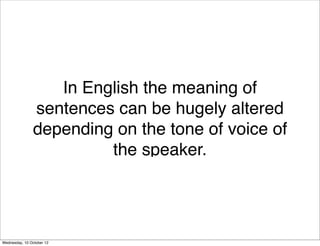
Introduction to pinyin
- 1. In English the meaning of sentences can be hugely altered depending on the tone of voice of the speaker. Wednesday, 10 October 12
- 2. Native English speakers are adept at picking up dozens of nuances in the way that words are said and the possible meaning that those tones may carry; sarcasm, anger, amusement, mocking - all of these can be layered into a sentence through manipulating the tone of your voice. Wednesday, 10 October 12
- 3. In Mandarin tone plays an equally important, but quite different, role. In Mandarin there are many words who's pronunciation sounds very similar to each other. Often the only thing that allows you to tell two words apart is the tone with which they are pronounced. Wednesday, 10 October 12
- 4. So "he" pronounced with a certain tone of voice means "to drink" while when it is pronounced in another tone of voice it means "river". Wednesday, 10 October 12
- 5. This does sometimes happen in English, but much more rarely and the rules are less clear. But consider this: if someone asked you how you were doing, you might reply, "Great." Wednesday, 10 October 12
- 6. By changing the tone of your voice however, you could change the meaning of the word "great" to mean that you were very well indeed, or actually pretty terrible. Wednesday, 10 October 12
- 7. The tone of your voice can give the word a totally different meaning. Wednesday, 10 October 12
- 8. But unlike in English, in Mandarin there are well documented rules on the different tones that are used in order to say different words. There are five tones in Mandarin, which are usually described as follows: Wednesday, 10 October 12
- 9. 1st tone - high and level Wednesday, 10 October 12
- 10. 2nd tone - mid and rising Wednesday, 10 October 12
- 11. 3rd tone - falling quickly then rising Wednesday, 10 October 12
- 12. 14th tone - falling Wednesday, 10 October 12
- 13. 5th tone - neutral Wednesday, 10 October 12
- 14. The number of the tone is written after the syllable is spelled out (sometimes the tones can also be represented by little lines above the letters, but that system is not used on Memrise). Wednesday, 10 October 12
- 15. So ma1 is "ma" pronounced with the 1st tone. And ma3 is "ma" pronounced with the 3rd tone. Wednesday, 10 October 12
- 16. All of which is straightforward enough, but how on earth do you remember which tone is which and which one you need to use for which word? Wednesday, 10 October 12
- 17. Well first, you have to get to know them. During the next level, we are going to focus on the pronunciations. Listen to words of each tone. Wednesday, 10 October 12
- 18. Get a feel for how they sound different. See what feelings each tone arouses in you, and build on those associations. Wednesday, 10 October 12
- 19. By establishing a strong set of emotional connections to each tone, you will find them much easier to remember. Here are the associations that work for me - but feel free to use whichever associations work best for you! Wednesday, 10 October 12
- 20. The 1st tone to me is the singing tone. It is high and insistent and a little bit annoying in an over-happy sort of a way. These words annoy me, but I feel a bit bad about that. They are happy and singing, after all. Wednesday, 10 October 12
- 21. The 2nd tone is a rising tone that sounds like a question to most English speakers. So think of 2nd tone words as questioning, worried and insecure words. I like these words because all I have to do is to think in a questioning way and I get the tone right because I naturally speak questions in a second tone. Wednesday, 10 October 12
- 22. The 3rd tone is the annoying, mocking school bully saying "wooo" in a down-up way while teasing you. It is a nasty, annoying tone. Urrgh. It also mis-behaves when put next to other tones, which is an irritating habit, but not one that you need to worry about yet. I hold this tone in total disdain. Wednesday, 10 October 12
- 23. The 4th tone is the authoritarian, imperative angry tone. It is the one that you shout things in. For all that, I am fond of this tone. Having a good shout every now and then is quite a pleasure. Wednesday, 10 October 12
- 24. 5th tone Well, it is nothing really. A limp, dejected tone skulking about in the corner casting furtive glances. You don't see too much of the 5th tone; he is always a bit of a mystery, sometimes there, sometimes not. I am a bit suspicious of him in truth. Wednesday, 10 October 12
- 25. Each level in this course will be repeated twice - once to test on the meanings and once to test on the pinyin pronunciations. That way you can focus on the aspect you most want to, and can even decide to skip one part altogether if you would prefer Wednesday, 10 October 12
- 26. Now let’s get started! Wednesday, 10 October 12